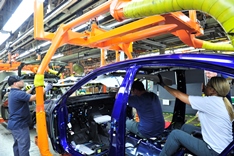 The Indiana Chamber recently co-sponsored two industry tours that brought educators and employers together to find ways to align efforts and better meet the needs of students.
The Indiana Chamber recently co-sponsored two industry tours that brought educators and employers together to find ways to align efforts and better meet the needs of students.
The first event was in Lafayette at Subaru of Indiana Automotive. Educators, counselors and administrators listened to representatives from Caterpillar, Nanshan America, Kirby Risk, Duke Energy and Chrysler Group. Each employer seemed to be facing the same issue – a significant portion of their employees will soon be eligible for retirement and the current talent pool cannot replenish their workforce.
The group toured the Subaru plant, where they saw nearly every process for building a vehicle. Subaru, like many manufacturers, hires employees of almost all educational backgrounds, from high school diploma to master’s degree.
The next industry tour was in the southwest region at NSA Crane, a United States Navy installation. The base is the third largest naval installation in the world by geographic area and employs approximately 3,300 people.
Representatives from GKN Sinter Metals, TASUS Corporation, Cook Group and Jasper Engines all spoke about their workforces. Overwhelmingly, employer needs center on soft skills (communication, basic math and professionalism) and workforce readiness.
Matt Weinzapfel of Jasper Engines reported that 48% of their workforce hold an associate’s degree and/or technical certification and 36% hold no post-secondary degree, while only 16% hold bachelor’s degrees.
The group toured the Crane naval base and learned about jobs in electronic warfare, strategic missions and special missions. The base also offers internships within the various sectors.
“All of these jobs sitting open can be filled if we break down the knowledge barriers and reach students,” said Dan Peterson, vice president industry & government affairs, Cook Group.
The Indiana Youth Institute hosted the events, with the Center for Education and Career Innovation and the Center of Excellence in Leadership of Learning also co-sponsoring.

 It’s only been a couple of years since the uproar over Indiana’s school accountability measures. To be sure, there were a lot of reasons for the pushback from educators and eventual legislation invalidating the current system. But one of the leading reasons was the decision to base “student growth” measures on comparisons of students to other students with similar starting points rather than measuring their progress toward the state’s academic standards.
It’s only been a couple of years since the uproar over Indiana’s school accountability measures. To be sure, there were a lot of reasons for the pushback from educators and eventual legislation invalidating the current system. But one of the leading reasons was the decision to base “student growth” measures on comparisons of students to other students with similar starting points rather than measuring their progress toward the state’s academic standards.